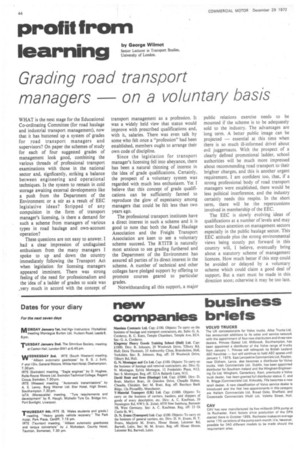profit from
Page 46

If you've noticed an error in this article please click here to report it so we can fix it.
learning by George Wilmot
Senior Lecturer in Transport Studies, University of London.
Grading road transport managers on a voluntary basis
WHAT is the next stage for the Educational Co-ordinating Committee (for road haulage and industrial transport management), now that it has buttoned up a system of grades for road transport managers and supervisors? On paper the schemes of study for each of four suggested grades of management look good, combining the various threads of professional transport examinations with those in the national sector and, signficantly, striking a balance between engineering and operational techniques. Is the system to remain in cold storage awaiting external developments like a push from the Department of the Environment or a stir as a result of EEC legislative ideas? Stripped ' of any compulsion in the form of transport manager's licensing, is there a demand for such a scheme from managers of various types in road haulage and own-account operation?
These questions are not easy to answer, I had a clear impression of undisguised enthusiasm from the many managers I spoke to up and down the country immediately following the Transport Act when legislation for licensing managers appeared imminent. There was strong feeling of the need for professionalism and the idea of a ladder of grades to scale was _very much in accord with the concept of transport management as a profession. It was a widely held view that status would improve with prescribed qualifications and, with it, salaries. There was even talk by some who felt once a "profession" had been established, members ought to arrange their own code of discipline.
Since the legislation for transport manager's licensing fell into abeyance, there has been a natural thinning of interest in the idea of grade qualifications. Certainly, the prospect of a voluntary system was regarded with much less enthusiasm. Yet I believe that this concept of grade qualifications can be sufficiently fanned to reproduce the glow of expectancy among managers that could be felt less than two years ago.
The professional transport institutes have a direct interest in such a scheme and it is good to note that both the Road Haulage Association and the Freight Transport Association are keen to see a voluntary scheme succeed. The RTITB is naturally most anxious to see grading furthered and the Department of the Environment has assured all parties of its direct interest in the scheme. A number of technical and other colleges have pledged support by offering to promote courses geared to particular grades, Notwithstanding all this support, a major public relations exercise needs to be mounted if the scheme is to be adequately sold to the industry. The advantages are long term. A better public image can be projected — essential at this time when there is so much ill-informed drivel about evil juggernauts. With the prospect of a clearly defined promotional ladder, school authorities will be much more impressed about recommending road transport to their brighter charges, and this is another urgent requirement. I am confident too, that, if a strong professional body of road transport managers were established, there would be less political interference, and the industry certainly needs this respite. In the short term, there will be the repercussions involved in membership of the EEC.
The EEC is slowly evolving ideas of qualifications at a number of levels and may soon focus attention on management sectors especially in the public haulage sector. This EEC attitude plus the strong environmental views being stoutly put forward in this country will, I believe, eventually bring about a statutory scheme of management licences. How much better if this step could be avoided or delayed by a voluntary scheme which could claim a good deal of support. But a start must be made in this direction soon; otherwise it may be too late.












































































